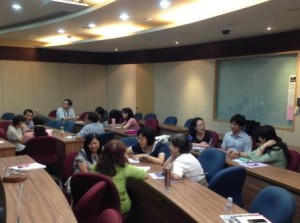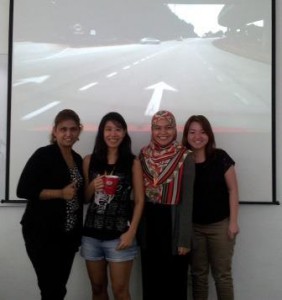
July 3, 2014, by Deepa Kumari Veerasingam
RTAD: External Involvement
External Training by Dr Christopher Hill
Research Training and Academic Development (RTAD) at UNMC offers a range of training courses, programmes and activities for the postgraduate community not only internally, but externally to other institutions. RTAD offers a series of international workshops, research training courses and continual professional development opportunities that focus on student and academic staff development in the areas of:
- Research management
- Research supervision
- Communication skills
- Project management
- Teacher development
- Writing skills
In May 2014, Dr Hill travelled to Taiwan to deliver three days of RTAD development courses to Kaohsiung Medical University (KMU) in the Southern city of Kaohsiung. Dr Hill is the Director of RTAD and he is also a convenor for the Knowledge Without Borders Network at UNMC. The training was delivered to academics from different backgrounds and levels and focused on class management, good practice in Higher Education and student engagement. The training was supported by the British Council in Taiwan and is part of a national drive to support academic development and internationalisation.
Rethinking Driver Licensing
The team members of RTAD were invited to participate in a psychology test – “What Happens Next?” by Phui Cheng Lim, a third year PhD student from the School of Psychology. The test was done on Thursday, 12 June 2014.
The test assessed a crucial aspect of effective driving, hazard perception and essentially, the ability to identify dangerous behaviours on other road users.
The research, which is a collaboration between the University of Nottingham’s UK and Malaysia campuses, initially examined the traditional hazard perception test, which has been used in UK driver licensing since 2002. The current test test asks drivers simply to indicate when they have detected a hazard on the road; “What Happens Next?”, on the other hand, requires them to predict events that are about to happen. While the initial hope was for the traditional test to improve road safety in Malaysia, the researchers found that the test was less effective in Malaysia compared to the UK.
“In Malaysia, the driving environment is more hazardous compared to the UK, so people tend to see events as less dangerous. The traditional test wasn’t really effective because people were responding when they thought the hazard became dangerous, not when they first noticed it,” said Dr Elizabeth Sheppard, Associate Professor from the School of Psychology, who led the research project in UNMC. “So, we looked for alternative ways to test hazard perception, and our research shows that “What Happens Next?” may be a more useful test not only in Malaysia, but also in the UK as well.”
Through this research project, Phui Cheng won the Best Press Release award and the title of the Overall Winner during the recent Research Showcase held in UNMC last month. Subsequently, she represented UNMC at the Research Showcase Finals in the UK on 18 June 2014.
-
Post a comment


